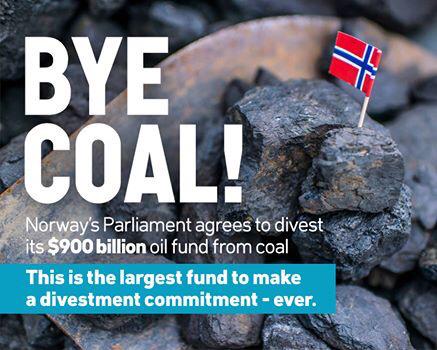Is Divestment from Fossil Fuels Popular? You Bet Your Stranded Assets It Is.

That said, here’s a news item that’s no joke whatsoever, from “Energy Matters”: Norway’s Government Pension Fund is the world’s largest sovereign fund ($1 trillion USD). The Fund announced it will sell its oil and gas stocks ($35 billion worth of shares). Shares to sell include: supermajors (from BP to Chevron); independents (including EOG Resources and Occidental Petroleum); oilfield services (like Schlumberger); and state-owned entities (Petrobras, Gazprom, PetroChina).
The point of divestiture, obviously, is to soften demand for debt and equities in the fossil fuel industry, thus increasing costs of capital, thus lowering valuations. To put it more professionally and accurately: A study by the Smith School of Enterprise and Environment at University of Oxford found that the stigmatisation of fossil fuel companies caused by divestment can “materially increase the uncertainty surrounding the future cash flows of fossil-fuel companies.” That, in turn, “can lead to a permanent compression in the trading multiples – e.g., the share price to earnings (P/E) ratio of a target company.”
But is this concept popular? You bet your assets it is.
In 2015, its was reportedly the fastest growing divestment movement in history. Beginning on campuses in The United States in 2011 with students urging their administrations to turn investments in the fossil fuel industry into investments in clean energy and communities most impacted by climate change, the movement soon spread across the globe. By December 2016, a total of 688 institutions and over 58,000 individuals representing $5.5 trillion in assets worldwide had been divested from fossil fuels.
Join in! It’s fun!

Craig,
People and institutions are free to invest their funds wherever they wish.
The ‘divestiture’ movement is an excellent example of a totally illogical, ideological type of mass hysteria that will eventually prove counter-productive to the ideals of those campaigning for divestiture.
Norway is a good example. The economy of Norway is heavily financed by the revenues from it’s largely state owned Petroleum industry.
Norway exports petroleum and petroleum products, machinery and equipment, metals, chemicals, ships, fish, with petroleum products accounting for more than 60%.
As long as a strong demand for fossil fuel products exist, these industries will find investors (including governments) queuing up to share the profits.
The only possible effect of such a divestiture campaign would be for Western capital, especially ‘ethical’ capital, to lose any say as how these companies operate. If the movement was successful, Western capital would be replaced by far less ethical capital from sources with very anti-environment, and anti-western agendas.
The whole movement reeks of hypocrisy. Idealists, including yourself Craig, remain enthusiastic consumers of fossil fuel products.
This ‘divestiture’ is a typical fuzzy, poorly thought through, leftist concept. Heavy on idealistic rhetoric, but possessing no practical value.
It’s reminiscent of the impact on Africa by the equally irrational mad, and irresponsible campaign conducted by the EU against genetically modified crops.
To the cheers of idealistic (and urban) leftist, EU anti-GM crops have had an enormous impact on maize production in sub-Saharan Africa. These nations were pressured into passing anti-GM laws.
Next year, and certainly the year after, much of Africa’s staple maize crop will be devastated by Spodoptera frugiperda, or Armyworm.
In the Americas, the introduction of Monosato’s Bt genetically modified maize has almost completely eradicated the Armyworn threat for a generation.
Even Greenpeace’s former director, Stephen Tindale, changed his mind about biotechnology before his death, observing :
“I worry for Greenpeace and the other green groups because by taking such a hard line, they are putting ideology before humanitarian action “.
Armyworms are slowly developing resistance Bt toxins and insecticides. Agriculture is an arms race against other species, and newer technologies must continually be developed.
Technology like gene-editing etc, is starting to provide resistance to maize lethal necrosis, a viral disease lowering maize crop yields, especially in Africa.
I see this a one of the first positive benefits of Brexit. Freed from the EU’s regulations British scientists can once again help their African colleagues.
That is, if the political campaigns funded by UK Greens, leftists and other ideologues don’t exert too much influence.
So go ahead, sell your shares and feel morally superior, but remember when you fill your gas tank, catch a plane, ride on the black top, buy medicine or any of the 350,000 products produced by fossil fuels, you are exporting the profits of America to nations who are American rivals.
Oh, and watch US Scientists, researchers etc move abroad as US universities lose funding and grant money.
The point of divestiture, obviously, is to soften demand for debt and equities in the fossil fuel industry, thus increasing costs of capital, thus lowering valuations.
Lynwood,
There’s very little chance of succeeding against international corporations with a huge demand for profitable products.
Most corporations would rather do without ‘ethical’ investors, and large sovereign wealth funds. As long as profits are steady, and dividends lucrative shareholders will continue to invest.
People and institutions are free to invest their funds wherever they wish? I think the SEC (among a number of entities) would take issue with that assumption. Like many human activities that can cause great good or great harm, regulation of investment is wise and necessary.
Cameron,
“People and institutions are free to invest their funds wherever they wish” .
Your objection to that generalized remark is a little obscure. Are you suggesting the SEC or some other organization acts as a sort of supreme broker ?
Or are you just being pedantic ?